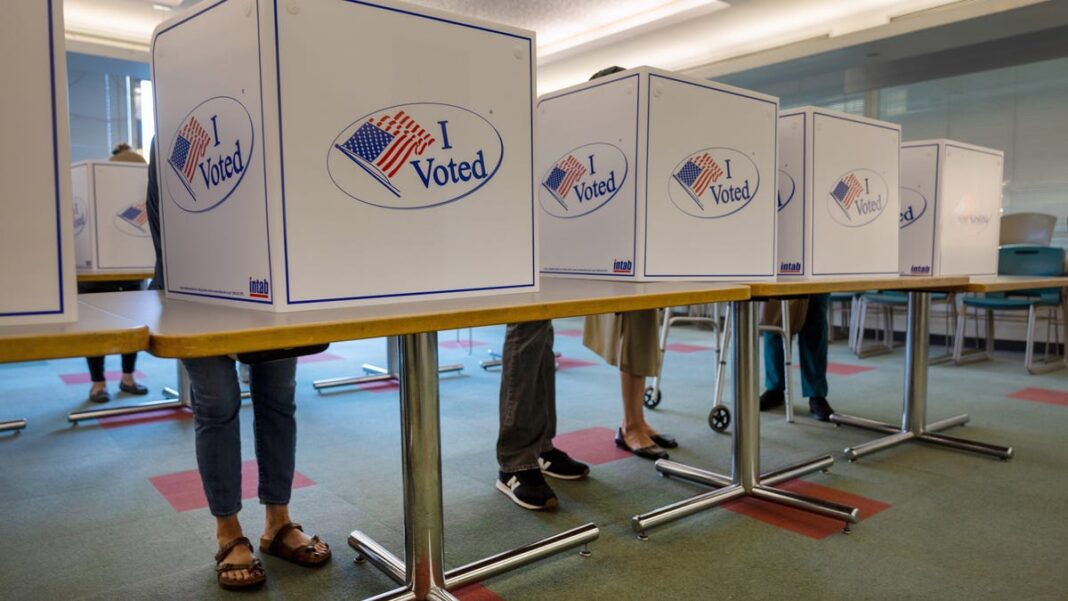Supreme Court permits Virginia to continue voter roll purge ahead of election
Research indicates that very few suspected noncitizens participate in voting, but Republicans are concentrating on removing them through lawsuits aimed at voter integrity this year.
WASHINGTON − On Wednesday, the Supreme Court gave Virginia the green light to carry out a purge of suspected noncitizens from its voter registration lists.
Despite opposition from three liberal justices, the court agreed to an emergency request by state officials to intervene after lower courts halted a program that had already removed over 1,600 individuals since August 7.
The court’s majority did not provide an explanation for their ruling, which is typical for emergency decisions.
Republican Virginia Governor Glenn Youngkin described the ruling as a “victory for commonsense and election fairness.”
Danielle Lang, senior director for voting rights at the Campaign Legal Center, which represented advocacy groups in the lawsuit, called it “outrageous” to allow “a last-minute purge that includes many known eligible citizens.”
“However, the voters will determine the outcome of this election, not the courts,” Lang stated. “Eligible voters in Virginia should know that despite this purge, they can still register to vote on Election Day and cast their ballots.”
Advocacy groups opposed this state policy because it targeted naturalized citizens for removal if they had previously indicated noncitizen status on motor vehicle forms. Youngkin’s program had sent notices to suspected noncitizens, stating they would be removed if they did not confirm their citizenship within 14 days.
However, since years may have passed since those motor vehicle declarations, advocacy organizations and the Justice Department contested the initiative in court, arguing that naturalized citizens were being unfairly removed from the voting lists.
One example cited was Prince William County Registrar Eric Olsen, who said in a Sept. 30 election board meeting that his office examined 162 individuals marked as noncitizens in the state’s database and discovered that 43 had previously voted. His office confirmed that all 43 had verified their citizenship—many multiple times—but were still removed from the voter rolls.
A Trump supporter who was removed from the voter rolls expressed to Cardinal News that he thinks he might have forgotten to indicate his citizenship status when renewing his driver’s license with the Virginia DMV.
Another individual who was affected by the purge told NPR she is uncertain why the DMV had inaccurately registered her as a noncitizen.
Besides prohibiting additional purges, U.S. District Judge Patricia Giles ordered the restoration of registrations canceled since August 7 because federal law forbids voter roll removals within 90 days of an election, ensuring voters have ample time to correct any mistakes. A federal appeals court upheld this ruling.
Virginia Attorney General Jason Miyares told the Supreme Court that the federal “quiet period” rules do not pertain to removing noncitizens from voter rolls because those individuals should not have been registered in the first place.
Even if a citizen is mistakenly removed from the rolls, Miyares asserted, that person can re-register to vote and cast a provisional ballot.
The Justice Department contended that Virginia could still look into individuals it suspects might be noncitizens, including the 1,600 targeted, but must avoid using broad removal tactics this close to the election.
“There is consensus that States can and should remove ineligible voters, including noncitizens, from their rolls,” Solicitor General Elizabeth Prelogar informed the Supreme Court. “The only question at hand is how and when they can carry this out.”
Research has shown that a minimal amount of suspected noncitizens actually vote, likely due to fears of criminal charges and deportation. Studies conducted by the Brennan Center for Justice and the libertarian Cato Institute indicate that noncitizen voting is virtually nonexistent.
Nonetheless, Republicans have emphasized the removal of suspected noncitizens in their voter integrity lawsuits this year.

